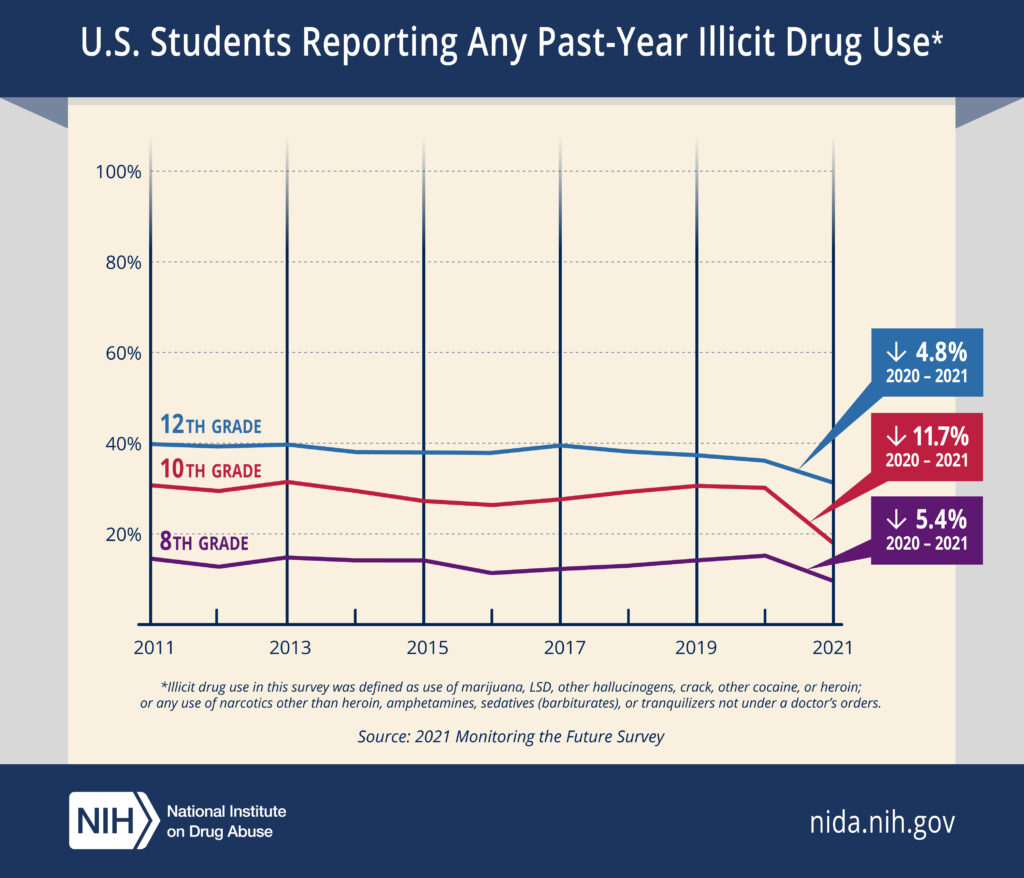Drug Use in Teens | Normal or Cause for Concern? | Latest Research
Introduction to Teen Drug Use
Teens go through a lot of change, both physically and mentally, as they begin their transition to early adulthood. As they begin to socialize less with family and more with peers, they are faced with many important decisions, including whether or not to use drugs and alcohol. And while the percentage of teens using drugs decreased significantly from 2020 to 2021, teen drug use is still very common. And, as the effects of the COVID-19 pandemic recede, it is likely that adolescent experimentation with drugs will continue to climb. While using alcohol, marijuana, and nicotine may seem like “normal” parts of the teen experience, new research shows that there are more long-term risks than previously believed.
Most Commonly Used Drugs by Teens
The Monitoring the Future Survey showed the following were the most commonly used drugs by teens in 2021. The following percentages represent how many of the individuals surveyed reported using the drug in the past year.
- Alcohol
- 58.2 % of 12th graders
- 41.9% of 10th graders
- 21.0% of 8th graders
- Marijuana
- 30.5% of 12th graders
- 17.3% of 10th graders
- 7.1% of 8th graders
- Nicotine
- 26.6% of 12th graders
- 19.5% of 10th graders
- 12.1% of 8th graders
- Illicit drugs other than marijuana
- 7.2% of 12th graders
- 5.1% of 10th graders
- 4.6% of 8th graders

Risks of Teen Drug Use
Teens Who Misuse Drugs Don’t “Outgrow It”
Until recently, it was widely accepted that most teens who use drugs would eventually outgrow their substance abuse issues. However, new research indicates that teens who use drugs may not just be “going through a phase” and it may not just be harmless experimentation. Rather, symptoms of substance use disorders in adolescence are likely to continue into adulthood.
The University of Michigan study, published in the April edition of the Journal of the American Medical Association, found that more than 60% of teens who report heavy use of alcohol, marijuana, and/or other drugs continue to have a drug problem as adults, often involving misuse of prescription medications. And, it’s not just the heavy users whose adolescent behavior influences their adult life. More than half of the teens who reported mild substance use disorder symptoms experienced mold to severe drug abuse concerns in adulthood.
Sean Esteban McCabe, lead author of the study and director of the Center for the Study of Drugs, Alcohol, Smoking and Health, states, “There has been some work suggesting most people age out of substance-related problems, but these studies have not adequately accounted for the severity of the substance-related problems.”
Related Reading: Teen Alcohol Abuse: How Worried Should Parents Be?

The Effects of Drugs on the Developing Brain
Atypical development of the brain and the onset of mental health issues could result from the use of a drug by teens. Mental health problems may include depression and anxiety, developmental delays, mental disorders, and suicide ideas. Studies have shown that smoking marijuana could be harmful to the short-term memory of a teenager’s ability to learn, as well as psychomotor abilities.
The Effects of Drug Use on The Body
Teens who abuse drugs significantly increase the risk of dying from accidents, illness suicide, or homicide. Teens who abuse drugs can result in risky behavior such as driving while under the influence or engaging in dangerous sexual activities.
The Impact on Social Life
Teen drug abuse can be detrimental to social acceptance as well as interaction with friends. It is not uncommon for substance abusers youngsters to quit activities, clubs, and sports events at schools. The lack of engagement could cause social disengagement and being viewed as a victim by friends.
Impacts on Academics
Low grades, low attendance, and a higher risk of dropping out prior to the time of graduation are all correlated with teenage substance abuse. The physical and mental negative effects of a teenage addiction to drugs could hinder academic success.

What Causes Teens to Use Drugs?
Based on the National Institute on Drug Abuse These are the five reasons that adolescents and teenagers are at risk of using alcohol and drugs:
- To be accepted (peer pressure or social acceptance)
- To feel happy (activate reward pathways within the brain)
- To Feel better (stress mental health, physical pain)
- To be better (enhance academic or athletic performance)
- To experiment (thrill-seeking, new experiences)
Depression
Major depressive disorder (MDD) is a well-known mental health condition that affects teenagers and young adults. The link between teens’ use of drugs and depression may create an endless cycle with serious implications for school performance and social interaction and the rest of a teen’s life. Teen substance abuse typically occurs in conjunction with mental health conditions like anxiety, mood behavior, as well as learning disorders.
Teens seeking treatment for substance abuse should be provided with a complete evaluation of their health (including their mental state). Research has proven that both mental health issues need to be addressed in conjunction in order for the treatment process to be successful. 4
Accessibility
A teenager’s environment is a major factor in their likelihood of committing addiction. Teens with easy access to alcohol and drugs are at a higher risk of becoming addicted. Access to alcohol and drugs poses the greatest threat to teens’ substance abuse. Educating for parents and teenagers is essential. Communication between teens and parents as well as safe medication storage and disposal can help save the lives of children.
Abuse of Prescription Drugs
Studies have revealed that one in four teens believe that prescription medications are suitable for study aids. Three out of three parents believe that ADHD medication can help improve the academic performance of their child even if their child is not diagnosed with any diagnose of ADHD. It’s not recommended for teens to use medications if they don’t have the prescription.
Help for Substance Abuse
All In Solutions Counseling Center is a trusted leader in addiction treatment with rehabs in Florida and New Jersey. If you or a loved one are struggling with substance abuse or mental health, feel free to reach out to our friendly admissions staff to ask questions, get support, or learn more about getting treatment.
Drug Use in Teens | Normal or Cause for Concern? | Latest Research-All In Solutions-All In Solutions - A Solutions Based Behavioral Healthcare Group
from All In Solutions https://ift.tt/GHlupVT
via IFTTT
